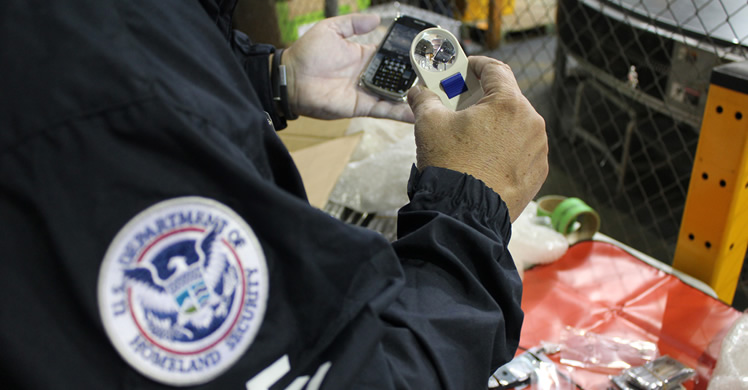New enforcement effort targets dangerous electronics
WASHINGTON – U.S. Immigration and Customs Enforcement (ICE) and U.S. Customs and Border Protection (CBP) – with support from the U.S. Department of Justice (DOJ) – have launched an initiative targeting the illegal importation and distribution of counterfeit consumer electronics known to present health and safety hazards by overheating, igniting, and causing severe injuries and extensive property damage.
The operation, named “Surge Protector”, will focus on electronics vulnerable to counterfeiting, including phony digital media devices, power adapters and consumer technology powered by lithium ion batteries. Counterfeit electronics are routinely the second most seized commodity during the course of intellectual property enforcement conducted by ICE and CBP. From Fiscal Year 2013 to FY 2015, homeland security personnel made over 17,000 seizures related to counterfeit consumer electronics, and the new effort will provide additional resources to agents and allow investigators to more effectively track arrests, indictments and convictions surrounding the illicit sale of these items.
Operation Surge Protector is being coordinated by the ICE-led National Intellectual Property Rights Coordination Center (IPR Center), which houses both the FBI and HSI intellectual property units. HSI’s IP section has been active in the area of counterfeit consumer electronics by providing support to agents investigating organized fraud and counterfeiting schemes targeting multinational technology companies. There are several dozen active investigations into the illegal sale of fake consumer electronics, as well as multiple pending federal criminal prosecutions brought by DOJ.
“The malfunction or failure of counterfeit consumer electronics could have dangerous consequences to U.S. consumers,” said Assistant Attorney General Leslie R. Caldwell of DOJ’s Criminal Division. “The Justice Department will continue to prosecute traffickers and manufacturers of these counterfeit electronics who choose profit over public health and safety.”
In FY 2016, CBP seized nearly 108,000 hoverboards worth an estimated $46.4 million at 54 different ports of entry for copyright violations, and recent increased enforcement actions focused on fake electronics resulted in hundreds of seizures, which prompted the IPR Center to review its operational portfolio and initiate a new effort dedicated to consumer electronics. Consumers planning to purchase technology, powered by lithium ion batteries, from brick-and-mortar retailers or online from independent sellers and third-party marketplaces can protect themselves by confirming the presence of an authentic Underwriters’ Laboratories (UL) certification seal on the product.
“Working for a safer world is UL’s mission and we take that responsibility very seriously,” said UL’s Chief Security Officer Brian Monks. “We will continue to do our part in helping protect people, products and places from counterfeit UL marked products and support law enforcement efforts to take unsafe products out of the hands of criminals and prevent them from reaching the hands of consumers.”
Founded in 2000, the IPR Center – formally codified in the Trade Facilitation and Trade Enforcement Act of 2015 – is one of the U.S. government's key weapons in the fight against criminal counterfeiting and piracy. The center uses the expertise of its 23 member agencies to share information, develop initiatives, coordinate enforcement actions, and conduct investigations related to IP theft. Through this strategic interagency partnership, the IPR Center protects the public's health and safety, the U.S. economy and the war fighters.


